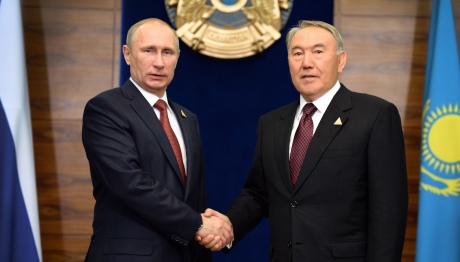Russia helps Kazakh nuclear power plans
30 May 2014
Kazakhstan's return to nuclear power is to be aided by Russian cooperation. An agreement on a new plant project was signed in front of the countries' presidents yesterday.
As well as being the world's largest supplier of uranium, Kazakhstan has previously used nuclear power to generate electricity and desalinate water. The Aktau fast-reactor plant operated on the shore of the Caspian Sea for 27 years but closed in 1999. More recently the country has been gradually increasing its involvement in the nuclear industry, now reaching the planning stages for re-introducing nuclear power.
Yesterday in the Kazakh capital Almaty, the CEO of state nuclear company KazAtomProm, Vladimir Schkolnik, met Rosatom head Sergei Kiriyenko and signed a cooperation deal on nuclear power, as well as a memorandum of understanding (MoU) on a new nuclear power plant. The signings took place in the presence of Kazakh leader Nursultan Nazarbayev during an official visit by Russian President Vladimir Putin.
 |
| Vladimir Putin and Nursultan Nazarbayev during their official meeting yesterday |
According to a Rosatom statement the MoU lays out each party's intentions in the design, construction, commissioning, operation and decommissioning of a nuclear power plant. The design and size of the plant remains open, and was listed only as having generating capacity of 300-1200 MWe. Its siting is still under discussion and financing for the plant is to be agreed in a bilateral agreement later this year.
As a uranium producer, Kazakhstan would obviously be keen to supply that raw material from domestic sources. It may also provide some value-added services in the production of finished fuel assemblies, according to the MoU.
Further to the power plant, the countries signed a "comprehensive development program" for their nuclear power cooperation, which assumes further development, joint projects and cooperation on radiation protection.
"Before 28 October" the countries will also sign off some "specific measures that facilitate promising uranium deposits in Kazakhstan by Rusia-Kazakhstan joint ventures," said Rosatom.
Lastly, yet more agreements between the countries included cooperation in renewable energy and production of rare earth metals.
Kazakh fuel capabilities
Kazakhstan has been growing its capacities in the front end of the nuclear fuel cycle which spans uranium mining to the creation of the fuel assemblies that are loaded into a reactor.
After a program of expansion and joint ventures with foreign partners, Kazakhstan now produces about 22,550 tonnes of uranium per year - about 38% of the global total. Since the Soviet era the Ulba Metallurgical Plant has refined uranium, converted it to uranium hexafluoride and produced fuel pellets for VVER and RBMK reactors. For the intermediate steps of uranium enrichment KazAtomProm has taken a 10% stake in the Rosatom-led International Uranium Enrichment Centre at Angarsk in Siberia, while a joint venture with Cameco aims to modernise the conversion process, although this has been put on hold.
Researched and written
by World Nuclear News